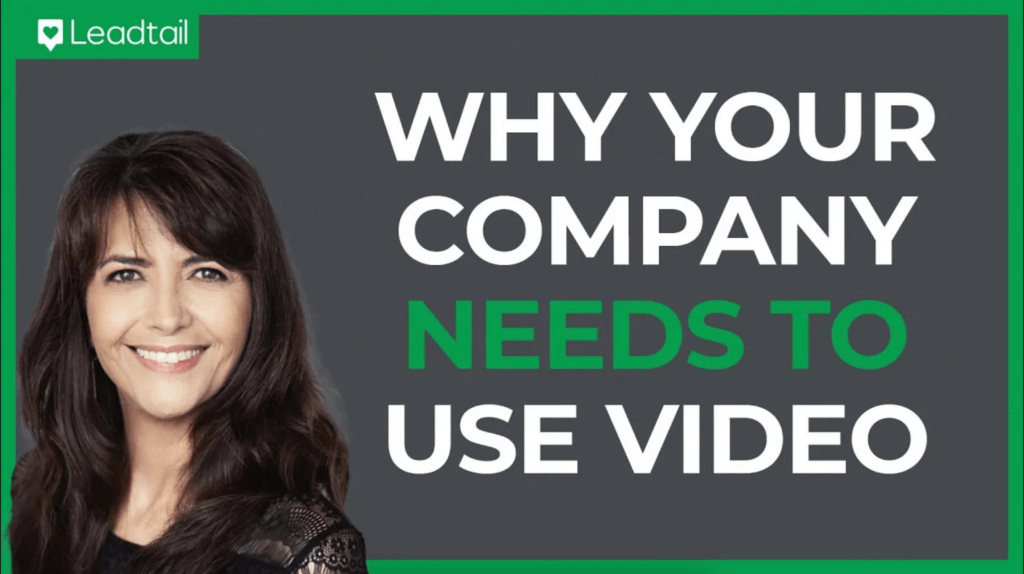In the fast-paced world of B2B marketing, video is not just an option anymore; it’s an essential part of any B2B marketing strategy.
In this episode of Leadtail TV’s Tomorrow’s Best Practices Today, Beth Forester explains why B2B companies should prioritize video, focusing on YouTube as a tool for driving leads, deals, and growth.
Let’s delve into some of her valuable insights that every senior B2B marketer should consider.
YouTube is Crucial for B2B
“YouTube’s the second biggest search engine in the world,” Beth says. “So the reality is, you need to be on YouTube.”
Companies are no longer just showcasing products or doing tutorials. They’re creating engaging content, emphasizing thought leadership, and tapping into current discussions in their industry and society at large. In short, if your B2B company isn’t on YouTube yet, you’re missing out on a massive audience.
Human Connection through Video
Post-pandemic, there’s been a seismic shift in how businesses operate.
With more people in remote or hybrid workspaces, traditional in-person meetings have given way to asynchronous communication. As Beth points out, “Why spend all that time in meetings when you can easily share a video and show and tell really quickly?” B2B companies are only now beginning to realize the power of video for telling your story, sharing your products, and engaging with audiences who want to learn more.
And we can’t discount the human touch. While in-person meetings are probably the most effective way to foster strong relationships, video is an effective way to show off the best of your brand and give potential customers insight into “who you are,” as Beth puts it.
Video lets potential customers see your brand and product as more than just a list of features and benefits. Video enhances your message with a glimpse of your brand’s personality, values, and culture.
Authenticity over Perfection
There’s a prevailing misconception that videos must be ultra-polished or have Hollywood-level production values to make an impact. Nothing could be further from the truth.
Beth notes that authenticity is what truly resonates with viewers. Video doesn’t have to be “polished or perfect” to make an impact on viewers. In fact, she advises against letting “perfection get in the way of progress.”
This is a comforting reminder for marketers who might be hesitant about creating video content because they don’t have a big budget or state-of-the-art equipment. Nothing delivers more value in B2B video marketing than the authenticity of your brand—and your people—shining through.
Speed & Adaptability
In the age of instant digital communication, flexibility and pace are crucial elements for any successful marketing initiative. And it’s even more true when it comes to video.
We don’t have the luxury of waiting. According to Beth, real-time feedback and changes in video creation are vital. She explains how Animoto, the company where she works, focuses on real-time adaptability, allowing marketers to immediately make changes based on what’s happening to the video.
This kind of agility is invaluable for producing the best possible results with your video content.
Interactivity & Engagement
So, how can we optimize our B2B marketing videos for engagement?
Beth stresses the importance of having a human face early in the video to capture the viewer’s attention. Remember, one of the most significant strengths of video for B2B marketing is the human connection it facilitates.
Your viewers are looking for authenticity, for a glimpse “behind the curtain” of your brand. That’s why videos tend to resonate more with viewers when they start with a personal touch.
Internal vs. External Videos
One of the significant insights from Beth’s conversation was the increasing importance of internal videos. Businesses now use video extensively for internal training, onboarding, and meeting recaps.
Beth highlights how internal video usage influences external communications, making it easier for teams to communicate their message externally once they are comfortable doing so internally.
Creating a video-first culture is essential to any long-term video marketing strategy. As leadership and employees get more comfortable with video, they’ll be more likely to share their authentic selves and communicate the company’s culture and values to your audience of potential customers.
As the world continues to evolve, video is not just a luxury but a necessity. Undoubtedly, video will continue to play a pivotal role in the B2B marketing landscape. So, as you strategize your next marketing campaign, brainstorm ways to include video in your strategy. As the old saying goes, the best time to start was yesterday, and the second-best time to start is right now.
Ready to get started with video marketing for your B2B social media channels? Let’s talk!
